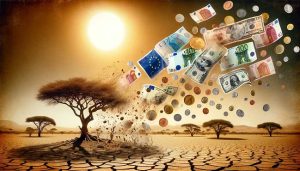A new report commissioned by the governments of Colombia, Kenya, France and Germany lays bare the devastating effect of debt burdens for many vulnerable low-income countries.

The Expert Review on Debt, Nature and Climate reveals the extent to which unsustainable debt burdens, loss of in nature, and escalating climate change are compounding one another in a hugely destructive “triple crisis”.
Countries most exposed to climate change and nature loss are increasingly having to borrow to fund disaster response and recovery and climate adaptation. But environmental shocks and stresses then constrain economic growth and public revenues, reducing their ability to service debt, and raising the interest rates they face.
This then further damages a country’s ability to invest in climate- and nature-positive development, and this vicious circle means there is no addressing the climate crisis without addressing the debt crisis.
A “virtuous circle” of environmentally sustainable and inclusive growth is possible, the report argues, but only if strong domestic policy is matched by international financial support.
The report shows how the COVID-19 pandemic, fuel and food price inflation, a strengthening US dollar and soaring interest rates have left many countries at high risk of “debt distress” – being unable to pay their debts – at the same time as extreme weather events have become more frequent and severe.
The report shows how the “Debt Sustainability Frameworks” used by the World Bank and IMF to assess the affordability of sovereign debt fail properly to consider the links between debt, climate and nature loss. It makes a series of recommendations for their reform.
The Expert Review was established to catalyse a response to the triple crisis. This interim report provides a diagnosis of the scale of the issues in the hope of establishing greater international collaboration towards solutions. The final report, to be published in Spring 2025, will provide a series of recommendations on how debt can be made more sustainable, both fiscally and environmentally.
Vera Songwe, former UN Under-Secretary General and Expert Review Co-Chair, said: “Many low- and middle-income countries are facing a ‘triple crisis’ not of their own making, with high global interest rates compounding increasingly severe climate impacts and nature loss. Unless the international community collectively takes measures to address this, countries are not going to be able to pursue the climate-resilient, low-carbon and nature-positive growth which they need – and of which they are capable.”
Moritz Kraemer, former Global Chief Ratings Officer of S&P Global and Expert Review Co-Chair, said: “The increasing economic impact of climate change and nature loss make it critical for the IMF and the World Bank to revise the way they assess the sustainability of countries’ debt. We hope that our report will help them do this.”
Ali Mohamed, Special Envoy for Climate Change, Executive office of the President of Kenya & Chair of African Group of Climate Negotiators, said: “This interim report highlights the inescapable reality that we cannot address the climate crisis without tackling the growing burden of debt. Vulnerable nations are caught in a cycle of borrowing to recover from climate disasters, further straining their economies.
“It’s time for the global community to come together, not just to restructure debt, but to recognise that investments in nature and climate resilience are fundamental to long-term economic stability. Our goal is to turn this vicious cycle into a virtuous one, where sustainable investments lead to prosperity and resilience, rather than debt distress.”
